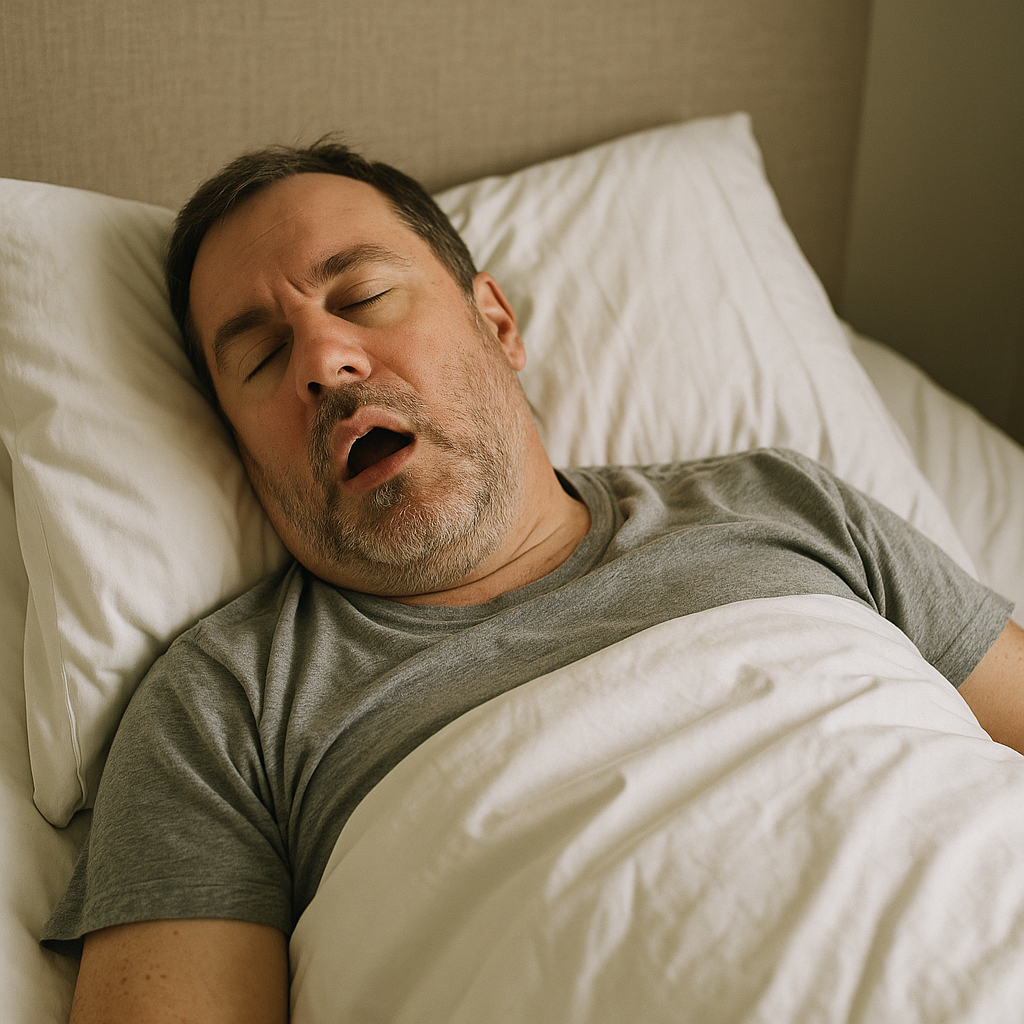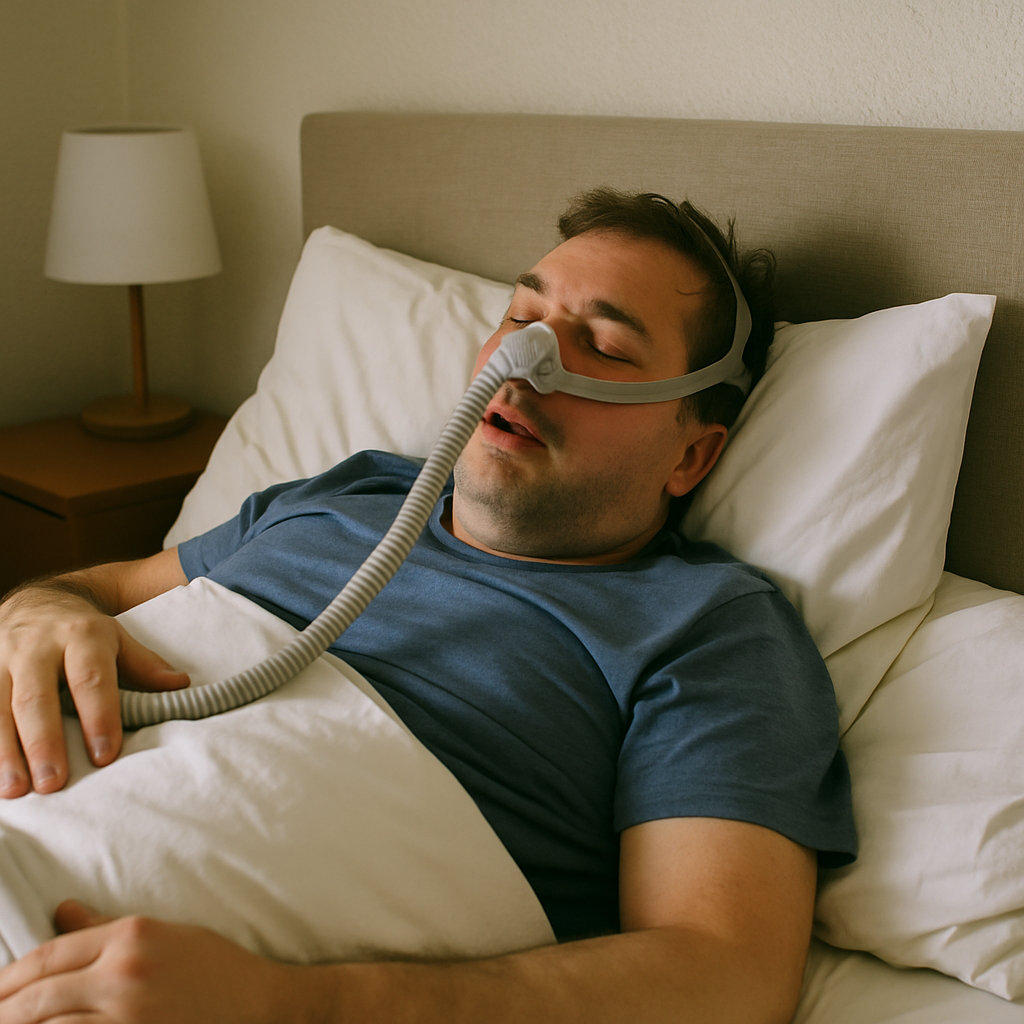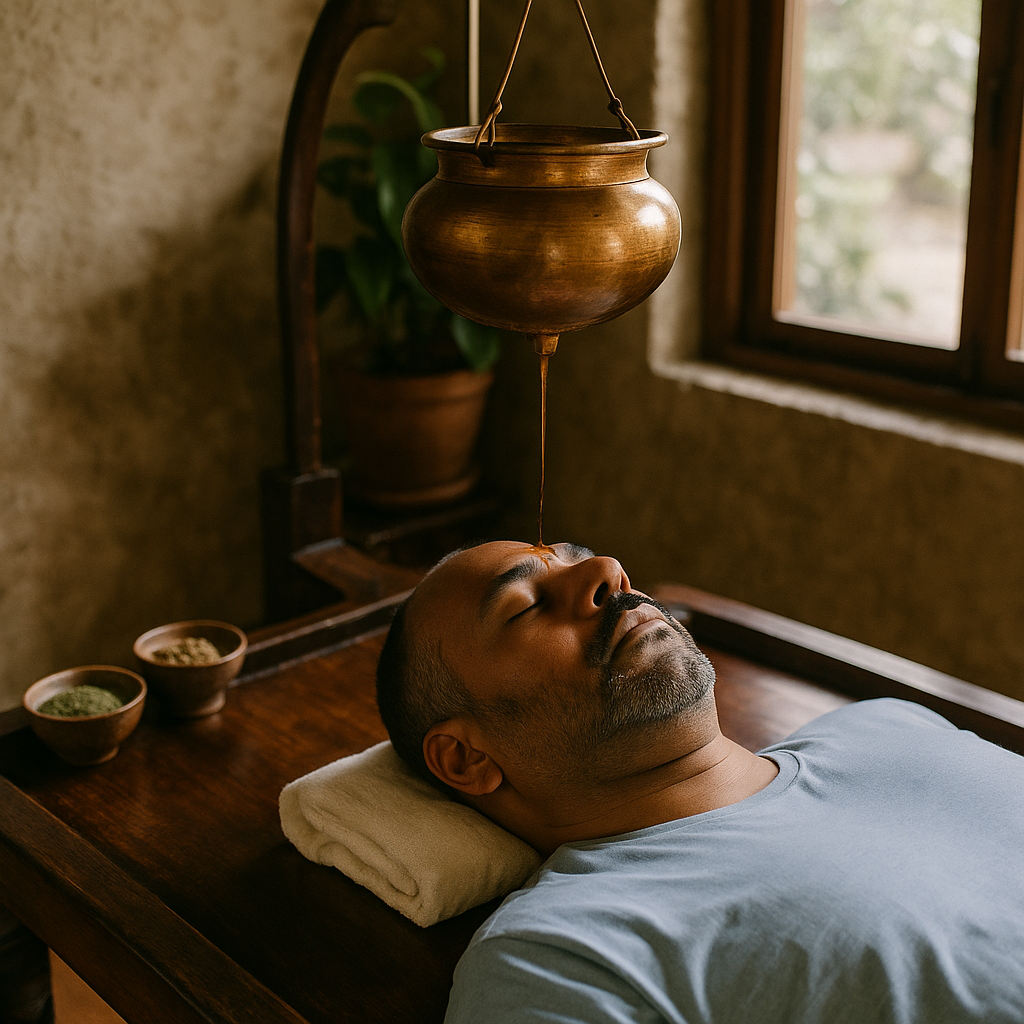आयुर्वेदिक डॉक्टर से प्रश्न पूछें और निःशुल्क या भुगतान मोड में अपनी चिंता की समस्या पर ऑनलाइन परामर्श प्राप्त करें। 2,000 से अधिक अनुभवी डॉक्टर हमारी साइट पर काम करते हैं और आपके प्रश्नों का इंतजार करते हैं और उपयोगकर्ताओं को उनकी स्वास्थ्य समस्याओं को हल करने में प्रतिदिन मदद करते हैं।
What Is Sleep Apnea: Definition, Symptoms, and Remedies According to Ayurveda

You know that feeling where you wake up and it feels like you barely slept? You’re groggy, maybe your mouth is dry, your partner’s annoyed at your snoring—and weirdly, your heart’s racing a bit? Yeah, that could be more than just a bad night. It might be sleep apnea.
What is sleep apnea? Well, it's more common than most people think. And honestly, it's underdiagnosed. I've heard so many stories from folks who brushed off their exhaustion for years, not knowing there was an actual name—and treatment—for it. Especially if you're looking for a more holistic approach, like Ayurveda, this is a journey worth diving into.
So in this piece, we’ll look at what sleep apnea is, how you might spot it, what causes it (spoiler: it's not just about weight), and what Ayurvedic medicine for sleep apnea can offer in terms of treatment and understanding. We'll also chat about practical self-care, yoga, and even how your doshas could be involved.

What Is Sleep Apnea? Definition and Overview
Let’s define it straight up: Sleep apnea is a condition where your breathing repeatedly stops and starts while you’re asleep. Yep—your body literally forgets to breathe. These pauses can last seconds to even a minute or more, and they may happen dozens or even hundreds of times a night.
So, what is sleep apnea exactly doing to you? Every time your breathing stops, your brain jolts you awake—just enough to restart breathing, but not enough for you to remember it. That means fragmented sleep, even if you "slept" for eight hours.
From a clinical standpoint, sleep apnea definition involves disrupted airflow and decreased oxygen levels during sleep. But that’s just one side of it. Ayurveda would see this as a deeper imbalance—a disharmony of prana (life force) and agni (digestive fire), likely stemming from stress, ama (toxins), or doshic imbalances.
स्वयं दवा न लें और प्रतीक्षा न करें। अभी डॉक्टर से चैट शुरू करें
Types of Sleep Apnea and How They Differ
Now let’s get into the types of sleep apnea. Because it’s not a one-size-fits-all condition. The causes, symptoms, and treatments shift depending on the root type.
Obstructive Sleep Apnea
This one’s the most common. With obstructive sleep apnea, your throat muscles relax too much during sleep, blocking the upper airway. It’s often linked to obesity, alcohol use, or structural issues like enlarged tonsils. People with this type tend to snore loudly or gasp for air. You might not notice it—but your partner probably will.
Central Sleep Apnea
This one’s trickier. It’s not about physical blockage, but a disconnect between your brain and breathing muscles. Basically, your brain "forgets" to tell your body to breathe. Central sleep apnea is less common and often tied to serious health issues like heart failure or neurological conditions. It can sneak up without the usual loud snoring signs, which makes it even more elusive.
Complex or Mixed Apnea
As the name suggests, complex or mixed apnea is a combo of both obstructive and central types. It might start off as obstructive, but then central patterns kick in—especially during treatment with CPAP machines. This form can be hard to treat and often needs a more nuanced, integrative approach.
Symptoms and Signs of Sleep Apnea
The thing with sleep apnea is—most people don’t realize they have it. You’re asleep when it’s happening, after all. So it often goes undetected until someone else points it out, or until your body starts really waving red flags.
Night-Time vs Day-Time Symptoms
At night, the classic symptoms of sleep apnea include loud, persistent snoring, gasping for air, or choking sounds that might wake you—or your bed partner—up. But again, some people never fully wake up, so they don’t even realize it's happening. You could be having these episodes dozens of times an hour without remembering a thing.
Daytime signs of sleep apnea can be sneakier. Chronic fatigue. Morning headaches. Dry mouth. Brain fog. Trouble concentrating. Mood swings. Even depression. I’ve talked to people who thought they had ADHD or burnout, when it was really just sleep apnea wreaking havoc.
What makes it tricky is that these symptoms overlap with a bunch of other conditions. So unless you're actively looking for the signs of sleep apnea, it can be easy to miss.
And not to be dramatic, but untreated sleep apnea isn’t just about feeling tired. It can seriously affect your heart, your metabolism, your immune function—everything.
When to Seek Diagnosis
So, when should you get checked? If you're noticing any combo of the above symptoms—and especially if someone has heard you stop breathing in your sleep—it’s time to talk to a doctor. A sleep study (called a polysomnography) is usually the go-to diagnostic tool.
From an Ayurvedic standpoint, if you notice excessive kapha symptoms (like heaviness, sluggishness, congestion), along with disturbed sleep and lack of pranic flow, that could be an early sign as well.
Trust your instincts. If you feel like your sleep isn’t doing what sleep is supposed to do—rejuvenate you—it’s worth digging deeper.

What Causes Sleep Apnea?
Here’s the thing: there’s no single cause of sleep apnea. It’s usually a mix of physical, neurological, and lifestyle factors. In the Western model, the focus is often on anatomy. In Ayurveda, it’s more about imbalance—of doshas, diet, daily rhythm.
Structural and Lifestyle Factors
In terms of structure, sleep apnea causes include things like excess weight (especially around the neck), a narrow airway, or large tonsils. Alcohol, smoking, and sedatives can also relax throat muscles too much during sleep.
Sleep position plays a role too—back sleeping is the worst for apnea because gravity works against you. And then there’s age: older adults are more prone, especially men. Though, interestingly, many women go undiagnosed because their symptoms present differently—less snoring, more fatigue.
Chronic stress also factors in, tightening muscles, altering breath rhythms, and suppressing good sleep. I’ve seen cases where just cutting caffeine after 2 p.m. and doing evening breathwork helped reduce apnea episodes.
Dosha Imbalances and Nidra Disorders
In Ayurveda, what causes sleep apnea goes deeper. It could stem from vitiated kapha leading to stagnation and mucus buildup in the airway. Or excess vata causing erratic breath patterns and nervous system dysregulation. Sometimes, a weak agni means poor digestion, leading to ama buildup, which interferes with energy flow and breathing.
There’s also the concept of Nidra rogas—sleep disorders caused by imbalance in bodily rhythms. Disrupted dinacharya (daily routine), late-night eating, emotional overload—all can disturb the mind-body flow necessary for healthy sleep and breath coordination.
I once met an Ayurvedic practitioner who described sleep apnea as “breathless dreaming”—a state where the body is trying to repair, but the channels (srotas) are too blocked for prana to move freely. That image really stuck with me.
Ayurvedic Medicine for Sleep Apnea
Here’s where things get interesting. Ayurveda doesn’t treat sleep apnea as a fixed disease with one-size-fits-all solutions. Instead, it sees your symptoms in context—your constitution (prakriti), imbalances (vikriti), daily habits, even your emotional patterns. That’s what makes Ayurvedic medicine for sleep apnea feel more personal and less mechanical.
Herbs and Oils That Promote Better Breathing and Sleep
Some herbs have a reputation for helping regulate prana and promote restful sleep. Tagara (Indian valerian), Jatamansi, and Ashwagandha are known to calm the nervous system and ease tension in the upper respiratory system. Yashtimadhu (licorice root) is often used to soothe the throat and reduce inflammation.
Nasya therapy (nasal oil application) with medicated oils like Anu Taila can clear the sinuses and improve airflow. I’ve tried it myself before bed—it's odd at first, but it definitely makes breathing feel lighter.
Steam inhalation with eucalyptus or tulsi can also help open the airway naturally. Think of it as preparing the body for a smoother night, not forcing anything.
Recommended Dinacharya for Better Sleep Quality
Routine is medicine. A solid dinacharya—daily rhythm—can do more for sleep apnea than people give it credit for. Waking up and sleeping at the same time, eating the main meal at noon, avoiding screen time after dark, self-massage (abhyanga) with warm sesame oil… all help to pacify vata and stabilize kapha.
Even a simple evening ritual—like warm herbal tea, a foot massage, and five minutes of silent breath awareness—can support deeper, more peaceful sleep.
Self-Care and Lifestyle Changes for Managing Sleep Apnea
Diet and Weight Management
Let’s be real: weight plays a role in many cases of obstructive sleep apnea. But instead of crash diets or harsh regimens, Ayurveda recommends sattvic eating—fresh, seasonal, nourishing meals eaten with mindfulness.
Avoiding heavy, oily, or cold foods at night is huge. So is cutting out late-night snacking. Trikatu (a blend of black pepper, long pepper, and ginger) can help stoke digestion and reduce excess kapha.
Breathwork, Yoga Nidra, and Pranayama
Breath is everything. Pranayama techniques like Nadi Shodhana (alternate nostril breathing) or Bhramari (humming bee breath) calm the mind and regulate breath patterns naturally.
Yoga Nidra, a form of deep guided rest, can retrain the body to relax without slipping into apnea-triggering patterns. I’ve heard of people doing daily Yoga Nidra for just 15 minutes and noticing fewer wake-ups within a few weeks.

Sleep Apnea and Mental Health Connection
Anxiety, Mood Swings, and Cognitive Impact
Chronic sleep deprivation from untreated apnea can cause or worsen anxiety, depression, irritability, even memory loss. You start questioning yourself: “Why can’t I think straight?” or “Why am I so emotional lately?” It’s not just in your head. It’s in your sleep.
Ayurvedic Tools to Support Mind-Body Balance
Manasika (mental) balance is deeply woven into Ayurvedic care. Herbs like Brahmi, Shankhpushpi, and Vacha support cognitive clarity. Meditation, mantra chanting, and sattvic living aren’t just nice ideas—they’re tools to rebuild resilience.
Conclusion
Sleep apnea isn’t just about snoring. It’s a silent disruptor—of breath, of energy, of life rhythm. But it’s also a wake-up call. With the lens of Ayurveda, we can see it not as a problem to “fix,” but as a signal: that the body wants balance, clarity, and care.
Yes, modern sleep apnea treatments like CPAP machines and surgeries have their place. But for many, exploring Ayurvedic medicine for sleep apnea, making real lifestyle changes, and learning to listen to the breath again can be a game-changer.
You don’t have to fight your body—you can work with it. That’s the whole point.
FAQs
Can sleep apnea kill you?
Untreated sleep apnea increases the risk of serious health problems like stroke, heart disease, and accidents due to fatigue. So yes, indirectly, it can be dangerous if ignored.
Can sleep apnea be cured?
For some people, yes—especially with lifestyle changes, weight loss, or surgery. But for many, it's a condition to manage long-term with support and awareness.
Is sleep apnea genetic?
There seems to be a hereditary link in some cases—especially for structural causes like jaw shape or airway size.
Can sleep apnea go away?
In mild cases or those caused by temporary issues (like weight gain), it might. But often, consistent management is key.
What foods or habits can worsen sleep apnea?
Heavy evening meals, alcohol, smoking, and erratic sleep patterns can all make it worse. So can ignoring stress.

